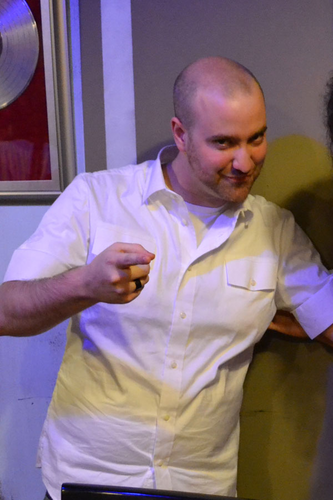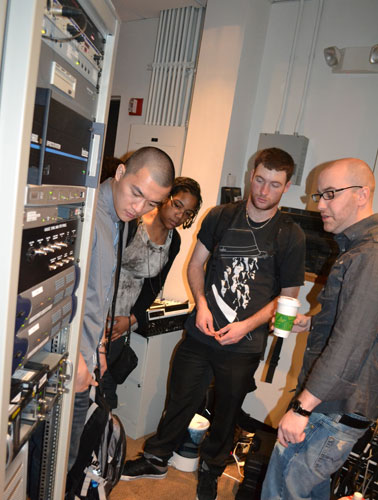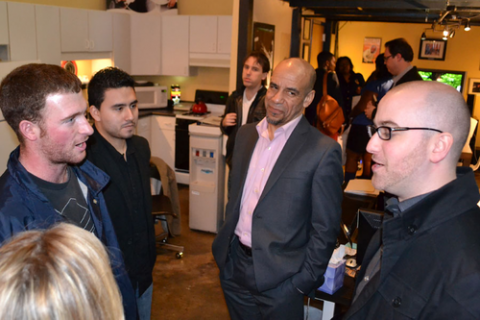Alumni Profile: Miles Walker '03

Miles Walker '03
Photo by Prince Charles Alexander

Miles Walker gives students a studio tour.
Photo by Prince Charles Alexander

At his studio, Miles Walker talks to students and chief of staff Carl Beatty, who taught him advanced MP&E classes.
Photo by Prince Charles Alexander
Atlanta-based Miles Walker's resume reads like a who's-who of the music industry's pop chart-toppers. From the Pussycat Dolls to Ludacris to Trey Songz to Katy Perry to Wiz Khalifa to Usher, his calling card is his superlative engineering skills. The 2003 alumnus earned his cred, and then some, with Grammys for Beyoncé's I Am. . . Sasha Fierce and Usher's Raymond v. Raymond, and for his work on the Grammy-winning Rihanna track "Only Girl (in the World)," along with other Grammy nods.
Walker studied music production and engineering (MP&E) at Berklee, which he credits for his strong foundation as a mixing and recording engineer. During the college's inaugural spring break trip to Atlanta, a group of Berklee students, faculty, and staff visited Walker's Parhelion Recording Studios, where they got a taste of how it's all done. Walker is a fast talker, and the students hung on his every word, clearly taken by his infectious energy and passion, technical skills, and spot-on musical instincts.
He invited the group to sit in on a recording session with a producer, songwriter, and manager, and gave them the chance to ask about the nuts and bolts of making a record. Walker also took time out to answer some questions about his time and influences at Berklee. The following is an excerpt of that conversation.
How did Berklee prepare you for this job?
The MP&E major is excellent because it's very accurate in terms of all the technical needs you'll have. You also learn about some of the personal traits you'll need as an engineer: studio etiquette and managing personal relationships [with people in the industry].
Tell me about some teachers who made a difference for you.
Some of my favorite teachers who are still there are Mitch Benoff and Mark Wessel. They were excellent teachers. And even though he's no longer teaching, [chief of staff] Carl Beatty was who I took all my advanced mix classes with and learned a tremendous amount from, not only personally but also professionally and technically.
Carl told me about the importance of record-making, that sometimes it's just about making a decision and sticking with it. He said he was debating one time with a producer about a mix. [The producer] said he wasn't sure if he wanted the snare up or down and they went back and forth for a long time. Carl just turned to him and said, "Do you drive a car?" The producer was like, "What do you mean?" Carl said, "Do you drive a car every day?" He said, "Yes, of course, I drive a car." Carl said, "If you drive a car, you make a million decisions that affect people's lives. . . this is a just a snare in a song, one in a million. Make a decision. Stick with it. Let's go." That's something that I think is really important because a lot of people get lost in the sauce when it comes to record-making. You've got to just keep it moving.
What's your pulse on the Atlanta market?
When I came here Atlanta was on fire because there was a lot of urban music and rap music was even more popular and a lot of rap-based artists were based out of Atlanta. YoungBloodZ, [producers] Jermaine Dupri and Bryan-Michael Cox. . . Akon. All these artists are still down here and based out of here. It was great, and a great time for urban music, so I made a lot of that. I've shifted to pop now. It's not that there isn't that alternative in Atlanta; it's just something I kind of like more myself.
I think Atlanta's a hot market, because artists come and go over time and Atlanta had a lot of hot rappers—it's still hot but rap is kind of less popular—but what Atlanta has and will always have is producers and songwriters, and if you go where the producers and songwriters go, you'll always stay busy because they're the people who are making music for the artists. So, as long as they want to make music, they're going to need people to record it. As an engineer, it's a great fit because there are a lot of opportunities to work with people in different styles.
In terms of your trajectory in opening your own studio, how did the market support that, given that a lot of artists you work with are outside of this sphere?
Technology kind of dictated that one. With the way people make records now on the internet, I don't have to be in the same place as the artist unless we're actually recording. And I'll usually travel to record with the artist. But when it comes to the mix, they can send me the files. I can work on it here. It makes sense that I'm going to stay here, where real estate is much cheaper than New York or L.A. I can own the exact same space here for say $2,000 or $3,000 a month when in New York it would be $10,000 a month for the exact same space. I'm able to keep my costs down, which I'm then able to pass on to the client and keep their costs down. . . . Owning my own place, I'm able to take on projects that I otherwise wouldn't be able to afford—me or anybody for that matter.
The Berklee students here on this trip are wide-eyed and excited. What advice would you give them?
Utilize your teachers. That's what I did and I think that's what helped me the most. The faculty, I really can't tip my hat to them enough. They were excellent and I knew that when I was there but once you leave you realize it's really a once-in-a-lifetime opportunity to be surrounded by such musical greatness. Take advantage of that to the fullest on a personal level as well as on a student level. They'll help you out. A professor [Mitch Benoff] there helped me get my first position in Nashville, which is where I first moved before I came to Atlanta. It was through my relationship with him that I was able to get my first job. I took the ball and ran with it on my own. . . I think it was because of the relationships with my teachers that I was able to have those first opportunities.
